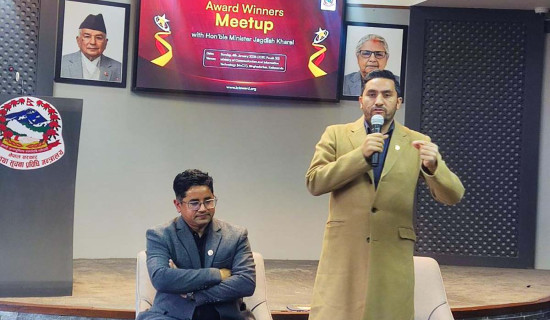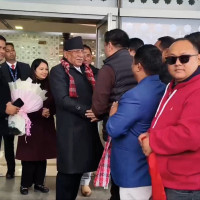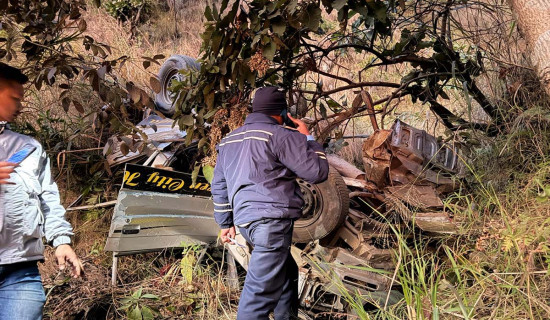- Sunday, 4 January 2026
Nepal makes big stride in cancer treatment
By Basanta Parajuli,Narayangadh, Sept. 26: It has been 25 years since institutional cancer treatment services began in the country, and significant strides have been made in its treatment over the years.
Until a few years ago, cancer treatment services were available only at BP Koirala Memorial Cancer Hospital in Bharatpur, Chitwan. However, these services have now expanded across the country. BP Koirala Memorial Cancer Hospital has begun diagnosing and treating cancer patients since September 27, 1999.
According to Dr. Anil Bikram Karki, President of the Nepal Medical Association, hospitals throughout Nepal are now offering specialised cancer treatment services.
“BP Koirala Memorial Cancer Hospital has now extended its network to the provincial level, and both the government and private hospitals are prioritising cancer treatment,” Dr. Karki said.
“This expansion has made cancer treatment and surgeries much more accessible throughout the country,” he added.
This year, cancer treatment services have been extended to Surkhet Provincial Hospital, Pokhara Institute of Health Sciences and Seti Provincial Hospital in Dhangadhi.
Skilled doctors from BP Koirala Memorial Cancer Hospital visit these facilities to assist in diagnosing and treating cancer patients.
In addition, government hospitals such as Bhaktapur Cancer Hospital and Sushil Koirala Prakhar Cancer Hospital in Nepalgunj have started offering cancer treatment.
Bir Hospital and TU Teaching Hospital Maharajganj have also launched cancer units.
Like Bharatpur Hospital, Bhaktapur Cancer Hospital, has also expanded its services to Koshi Hospital in Biratnagar and Narayani Hospital in Birgunj.
Private hospitals, including Chitwan Medical College Cancer Institute Birat Cancer Centre, Purbanchal Cancer Centre, Kathmandu Cancer Centre, Nepal Cancer Hospital, and National Cancer Hospital, are also playing a vital role in cancer research, diagnosis and treatment.
Shivaji Poudel, director of BP Koirala Memorial Cancer Hospital, said that with effective cancer services now available in Nepal, patients no longer need to seek treatment abroad.
“Cancer diagnosis and treatment within Nepal are now both high-quality and effective. We have created a situation where even patients who initially went to India for treatment are returning to Nepal for care,” Poudel said.
Shiva Parajuli from Kawasoti, Nawalparasi, had throat cancer surgery at Rajiv Gandhi Memorial Cancer Hospital in New Delhi, India, on June 12 this year.
However, when that surgery was unsuccessful, he returned to Bharatpur Cancer Hospital for a repeat procedure on September 2.
Parajuli explained that the treatment in Nepal was much more affordable and accessible than in India.
“In New Delhi, the high cost of treatment and language barriers were significant issues,” he stated, adding, “At least in Nepal, I felt more confident knowing my relatives could visit me during the surgery.”
Parajuli claimed that his treatment in New Delhi led to unnecessary expenses.
“I spent more than Rs. 550,000 in the hospital for the first surgery in New Delhi, but in Nepal, it would have cost just Rs.100,000,” he added.
Additionally, in Nepal, both the federal and provincial governments offer financial support for cancer treatment. The federal government provides Rs. 100,000 and the provincial governments offer Rs. 50,000 for cancer treatment.
Success story
Eighty-four-year-old Lekhnath Upadhyay from Siyari-9, Rupandehi, was informed 19 years ago by doctors at Sarvangin Hospital in Gorakhpur, India, that his prostate cancer was untreatable and asked his family to prepare for his final days.
However, when they brought him to Bharatpur Cancer Hospital in 2005, he underwent surgery that saved his life.
His son, Krishna Khanal, said his father’s surgery was nothing short of a miracle.
“My father’s recovery has been remarkable, and after all these years, he is still doing well,” he said, adding “This experience showed us that Nepal has skilled manpower and modern technology for cancer treatment.”
While there is no actual data on the number of Nepali cancer patients who seek treatment in India, Dr. Karki estimates that around 10 per cent of cancer patients still travel to India.
However, he said that 70 to 75 per cent of those who went to India for treatment eventually returned to Nepal to continue their treatment.
Patients on rise
BP Koirala Memorial Cancer Hospital, recognised as a model cancer hospital in South Asia, recorded 6,294 new cancer patients in the past year alone.
Out of 172,056 patients who visited the hospital’s outpatient department (OPD) the mentioned number were diagnosed with cancer.
Breast cancer was the most common, with 714 patients diagnosed with cancer, followed by lung cancer with 712, uterine cancer with 648, blood and bone marrow cancers with 433 and stomach cancer with 328 cases.
Lung cancer remains the leading cause of cancer in men while breast cancer is the most prevalent among women.
Based on patient data, Chitwan tops the list for the highest number of cancer patients by district, who came to seek treatment at Bharatapur Cancer Hospital. Other districts with high numbers of cancer patients include Rupandehi, Nawalparasi, Dang, Sarlahi, Bara, Makwanpur, Dhanusa, Rautahat and Tanahun.





-square-thumb.jpg)










